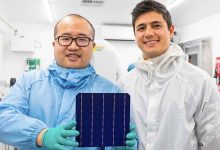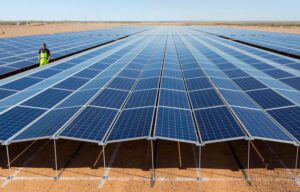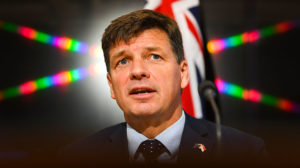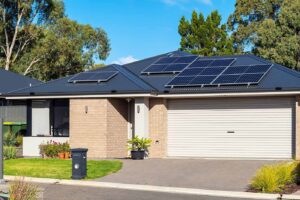Sydney-based solar start-up SunDrive – backed by billionaire Mike Cannon-Brookes and the Australian Renewable Energy Agency – says it has set a new world record for solar cell efficiency.
Founded by UNSW graduates and flatmates Vince Allen and David Hu in 2015, SunDrive’s primary goal is to replace the use of silver in solar module with copper, a cheaper and more abundant metal, and also continue the drive for improved solar cell efficiency.
On Twitter last week, SunDrive claimed a world record of 25.54 per cent for commercial size silicon solar cell efficiency, apparently overtaking the previous record held by China solar giant Longi.
It said the testing was carried out by Germany’s Institute for Solar Energy Research at Hamelin, and was also reported by the Chinese language website of PV-Tech, which provided more details of the record.
Australian technology making history!🇦🇺☀️
SunDrive has officially set a new world record for a commercial size silicon solar cell.
A proud milestone for the team that worked incredibly hard to achieve this. Stay tuned for what’s next… pic.twitter.com/xf9NtqqZ7I
— SunDrive (@sundrivesolar) September 9, 2021
RenewEconomy has sought to make contact with SunDrive for further information to verify and find out more about the world record claims, but had not received a response before publication.
A key point of difference for SunDrive’s solar cells is the use of copper instead of silver, offering the potential to reduce the cost of solar manufacturing.
The use of silver is considered a key barrier to broader solar uptake given the industry consumes some 20 percent of global silver annually, according to the Australian Renewable Energy Agency, which in October last year provided $3 million for SunDrive to help scale up its operations.
The company was first backed by solar technology pioneer and Suntech founder Shi Zhengrong, and more recently by Australia and NZ based VC investor Blackbird Ventures, as well as Grok Ventures, the private investment firm of Mike and Annie Cannon-Brookes.
Cannon-Brookes also celebrated the news on Twitter. “This little Aussie startup just set the world record for panel efficiency,” he said. “This is a big deal on the world stage – and it came from some super smart people in a small Sydney garage. Copper is the way.”
It was also noted by Pierre Verlinden, the Adelaide-based former chief scientist at Trina Solar, and solar consultant, who said:
“The PV industry is at a very important juncture. As we approach the annual production level of 1 TW p.a. ( in around or before 2030), we cannot afford to develop unsustainable PV technologies.
“Congratulations to the team at SunDrive Solar for developing a cost-effective silver-free metallisation for HJ solar cells, and at the same time improving the world efficiency record to 25.54%.”
Verlinden is on the board of advisors for SunDrive, along with other solar industry luminaries such as Dr David Mills and Professor Alison Lennon.
SunDrive is aiming to have a demonstration module using its cells by years’ end and is building a pilot 20-megawatt production line to be completed by 2022.
The ARENA grant was also designed to help the company – which began in a suburban garage in the Sydney suburb of Maroubra – hire 10 new staff, and it is still in recruitment mode, including most recently a solar module processor.
“SunDrive initially aims to use its technology to focus on the rooftop solar sector, where space is at a premium and higher efficiency cells can produce greater amounts of energy for a given footprint,” ARENA said in its press release last year.
“Over time the technology is expected to become more cost effective than current solar cell technologies and be adopted for large scale solar.”
ARENA CEO Darren Miller said last year it was fantastic to see an Australian solar startup at the forefront of producing the next generation of high efficiency solar cells, and SunDrive’s Allen said at the time the company hoped to contribute to Australia’s rich heritage of advancing solar cell technology.
“With this project we have an opportunity in Australia to lead the world in creating the best version of next generation solar cells. Our goal is to use the learnings from this project to bring to life a superior solar technology, creating new local industries which can compete on the global stage.”
“With only 3 per cent of world electricity coming from solar today, there is still so much innovation that must occur. Gaining the support from the Australian Government puts us in a stronger position to capitalise on the opportunity that lies ahead.”







